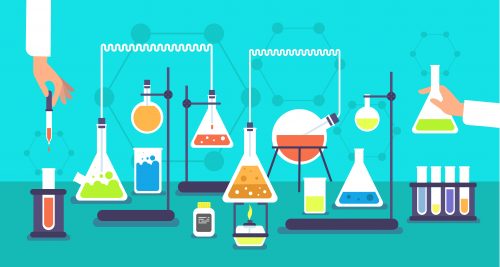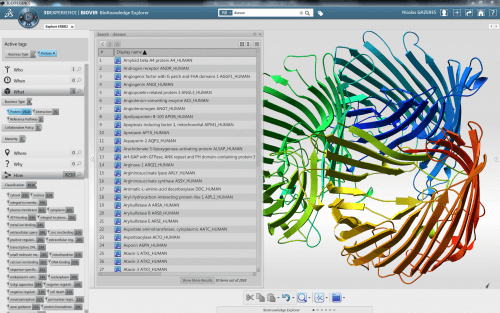This is what Leif Fridson, CEO of Biovia, the life sciences division of Dassault Systèmes, says during his first visit to Israel in an interview with the science website

The life science industry is changing today life science companies work more as a network of companies. This is what Leif Fridson, CEO of Biovia, the life sciences division of Dassault Systèmes, says during his first visit to Israel in an interview with the Hidan website. Biovia's software allows its customers to manage all development stages from beginning to end, the production stages and other processes such as quality control and more. According to Leif, the life sciences industry is changing "It was an industry of large companies, a closed industry of companies that did everything themselves. Today, life sciences companies work more as a network of companies, which changes the innovation process overall." He means that pharmaceutical companies are starting to outsource parts of the development process and are working with biotechnology companies on joint projects.
"This process also takes place in Israel. We met with several promising startup companies and we see that even the small startups are working with many external partners to bring their new drugs to market. Our software tools help those startups and companies to work better together, whether in managing the drug discovery process or striving to work together in order to achieve beautiful and desirable production results." Friedson said. "We are turning to the biotech industry and other industries that use new materials such as the chemical, food and pharmaceutical industries. We are looking at the Israeli market together with Eli Boikis, CEO of Dassault Systèmes Israel, and his team to understand what Biovia can bring to the Israeli market."
The digital production
Fridson spoke about the following in the field of life sciences and says "It can be said that there are a number of key advantages in digital production today, which makes it very significant and a factor that changes development from end to end. The first is the ability to trace and analyze the production process. For example, when there is a manufacturing problem, you can go backwards and see what decisions were made in the early stages of the drug's development that might later affect manufacturing. The second thing is the visibility advantage. Using our platform, you can transparently see and analyze the length of the product's life cycle. Third - the life sciences industry is maturing.. other industries such as the automotive industry for many years they have learned how to manage the so-called Bill of Materials (a list of raw materials, parts and assemblies and the quantities of each needed to produce an end product) for the entire life cycle of car production. Life science companies could not do this, until today, that the focus is changing and adopting the so-called Bill of Process - creating a platform for interdisciplinary teams and different roles to share information and collaborate in ways that were not possible before. This is needed to make it easier for life science companies to meet regulatory requirements and government bodies like the FDA. Another notable advantage is the ability to perform analytics, so the maturity achieved today in the fields of machine learning and artificial intelligence can help both startups and mature companies reach optimization earlier and gain a competitive advantage in the market, such as developing a drug faster. Beyond that, artificial intelligence can be used to collect and analyze data, throughout the life cycle of the development process. This has many advantages, such as preventing unnecessary repeated laboratory tests, making relatively early decisions about the degree of success of products to avoid waste, and discovering issues that will occur in the future during the production phase.

Do you have examples of success?
Fridson: "I believe that a good example of this is that we connected the French pharmaceutical company Sanofi with all its partners through a network on our platform, through which they can exchange essential information for the drug discovery process. For example, managing work with external laboratories and IP management. It is important to understand that our software understands science, so instead of sharing databases or data written on word processing software, researchers and scientists can exchange complex scientific files. For example, our software understands the structure of molecules, which becomes complex in the case of large molecules. It is very unique to us. The pharmaceutical companies no longer need Dropbox, but a real scientific platform where they can collaborate in the scientific aspect. There are many products that Pfizer and Snoopy and others have developed with our software. We bring engineering to science and science to engineering."
And what about the smaller companies and startups?
"We enable startups to succeed in two ways. The first is the possibility to join other companies, work together and cooperate, the second way is that we provide software products and solutions that are easy to use even for small startups. So if you are a small biotech company with three people we have software that runs on the cloud and on your computers to work. You don't need a minimum size or ability to use our software, you can get started right away. During our visit, I met with an Israeli startup, a total of two people in the company, who want to use our software to optimize the documentation processes and laboratory tests for drug discovery."
The Israeli biomed industry
What did you learn from the Israeli industry during the visit?
"I learned that in Israel there is a wonderful industry of life sciences and that people develop more on their own than I expected. I think there is an opportunity for the life sciences industry to embrace its beauty and leverage its benefits. We are building Biovia today to be the most widely used foundation software in the field of life sciences. Just like Microsoft Word for word processing. When we think about it a little more deeply, we can ask ourselves - but who will write today's Word for the field of life sciences?! In other words, in fact, Biovia is a standard software solution for the fields of life sciences, which provides more, which enables more opportunities for collaborations and to be more efficient in the development processes." Fridson concludes.
According to Eli Boikis, CEO of Dassault Systèmes Israel, "It is important to note that we do not only work with pharmaceutical companies. Although we are good and provide answers to the pharmaceutical companies, in key problems that the field has such as for example the discovery of molecules, formulation and process management, but we are also there for the agrotech, food and chemical companies. During Life's visit to Israel, we met with companies that produce food ingredients, and they also have a similar type of problem, which can be overcome using Biovia's platform. In fact, Biovia started from an acquired company called Excelros, whose foundation was scientific and whose goal was to help life science companies and other companies that work with materials better control the materials process. That is, the basis of the company was scientific, just as Dassault Système started with airplanes. Although, the purchase happened 4 years ago, but we are starting to see the results today. And there is a very great synergy, especially in the areas of simulation, geometric planning, the resource management platform, and more. In fact, some of the major customers in the aviation and automotive sectors who need to develop certain materials or materials that behave in a specific way receive a great deal of value through working with Biovia. When large companies buy large companies that take a long time to merge, we are at the point where we are ready to introduce all these new solutions to the Israeli market. I am happy that the CEO of Biovia came to introduce himself to the Israeli market, we had good meetings, the market is very developed and very large relative to the size of the country and I think we see a very large potential for business here. Now we can announce that Dassault Systèmes is entering the Israeli market also in the field of biotech".
More of the topic in Hayadan:
